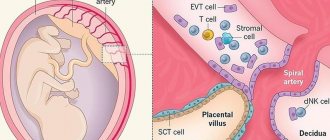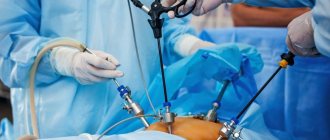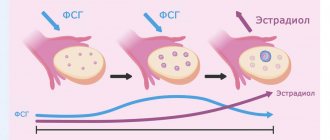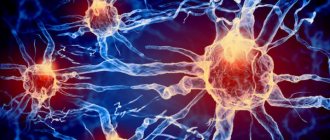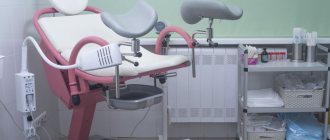Paired small glands to the right and left of the uterus, in which eggs develop and female sex hormones are produced, are called ovaries. The appearance of pain in them may indicate the development of pathology in the reproductive system, so it is very important to determine why the ovaries hurt using modern diagnostic methods.
How do the ovaries hurt?
Based on the nature of the pain and its location, the doctor can make an initial diagnosis and preliminarily determine why a woman’s ovaries hurt, referring her for the examination necessary in this case. The pain can be constant and short-term, aching and stabbing, dull and sharp, localized in the lower abdomen or radiate to the thigh, lower back, or perineum. Often painful sensations occur on the right or left side, indicating the location of the problem organ.
However, pain in the lower abdomen can easily be confused with appendicitis, diseases of the gastrointestinal tract or genitourinary system. Especially if it is periodic and manifests itself in different localizations - in the pubic area, on the right or left side and further up to the kidney. Only a specialist will be able to determine, for example, why the ovaries hurt before menstruation or why pain occurs after sex. Therefore, you should not postpone a visit to the doctor to determine the cause of the ailment.
Opinions and forecasts
According to Marcelle Cedars, a specialist in reproductive oncology at the University of California, San Francisco, researchers were quick to test a new method of treating infertility in humans: “Scientists demonstrated the birth of healthy offspring in preliminary studies on mice, but there was no evidence growth, development and/or fertility of this generation" [12].
The authors of the study believe that the method is suitable for infertile middle-aged women, as well as those who have been diagnosed with primary ovarian failure, as a result of which pregnancy does not occur in more than 50% of cases. However, not all experts share their optimism. The head of the medical group studying fertilization at the University of Southern California, Richard Paulson, is convinced that the key condition for the effectiveness of the developed mechanism of laboratory “activation” of the follicle is the presence of a healthy egg in it. In addition, Paulson draws attention to the fact that it is unreasonable to compare the results of treatment of a woman at the age of 29 with the results of treatment of a woman at 40, since hormonal stimulation of follicle growth and development occurs at different rates at different ages.
The considered conservative method of stimulating ovulation by blocking the Hippo signaling pathway in individual fragments of ovarian tissue may be useful for women with cancer or undergoing sterilization procedures. But still, the main achievement of scientists is the birth of a child to a woman who, without their participation, would never have been able to become a mother.
Causes of pain in the ovaries
Painful manifestations in the ovaries can occur due to many reasons. Sometimes they are not dangerous, since they accompany physiological processes - menstruation, pregnancy, ovulation, intestinal motility. But sometimes the reason why the ovaries hurt is pathological changes occurring in the body:
- ectopic pregnancy;
- inflammatory process;
- cysts, including those with pedicle torsion;
- benign and malignant neoplasms;
- endometriosis;
- hemorrhage in the ovary (apoplexy);
- the condition of other organs and systems - kidney stones, appendicitis, depression, gastrointestinal problems and others.
What changes with age?
A woman's ovaries contain a limited number of follicles, and over time these follicles are used up. At first, most cycles become anovulatory, that is, ovulation and the formation of the corpus luteum do not occur, which means there is little progesterone hormone. A woman’s menstrual cycle begins to change - it becomes longer or shorter, the intensity of menstruation changes, and the menstruation itself comes irregularly. When there are very few follicles left, the ovary stops secreting estrogens. At first, menstruation becomes rare and irregular, then stops. The last menstruation is called “menopause”. Climacteric syndrome begins to develop.
Pathologies that cause pain in the ovaries
- Women often wonder why the ovary hurts during ovulation and whether this is a pathology. Discomfort during this period is associated with the movement of a mature egg into the fallopian tube and rupture of the follicle where it developed. However, if the unpleasant sensations turn into painful ones, and do not go away even after taking a painkiller, this may indicate an infectious process. Due to chronic inflammation, the ovarian capsule becomes thickened, and rupture is either impossible or difficult, which causes pain.
- Aching pain accompanies the inflammatory process of the ovaries (oophoritis), which occurs due to hypothermia, infection, and endocrine disruption. It can radiate to the lower back, and additional symptoms include difficulty and pain in urination, vaginal discharge (sometimes purulent and with an unpleasant odor), weakness and fever. The presence of a chronic inflammatory process also answers the question of why the ovaries hurt after sex. Although sometimes the reason for this may be an uncomfortable position or too rough influence.
- Endometriosis is an overgrowth of the lining of the uterus that can affect the ovaries. In this case, when the endometrium is shed during menstruation, it causes aching pain in the ovaries.
- An ovarian cyst is a fluid-filled growth that in some cases causes no symptoms. It can either resolve on its own or increase in size. A large cyst causes nagging painful sensations in women during menstruation and before it, during sexual intercourse. As the tumor enlarges, the symptoms become more pronounced, raising an alarming question - why does the left ovary hurt or, conversely, pain is felt on the right. Acute and strong, it occurs in case of rupture of the cyst, its torsion or suppuration. In this case, urgent surgical intervention is necessary.
- Ovarian apoplexy is the main reason why the right ovary hurts, since it most often occurs on this side. This is a disease that is more susceptible to girls and young women. Acute pain is accompanied by a number of other symptoms: pallor, tachycardia, fever, vomiting, dryness of the oral mucosa.
The essence of the process is rupture of the ovary and extensive hemorrhage into the abdominal cavity. Sharp pain occurs suddenly, often associated with intimate relationships - this is why the ovaries hurt after sex, although this is not the only reason. You should consult a doctor immediately to avoid possible complications.
- Neoplasms of the ovary include tumors growing from its tissues - benign, borderline and malignant. In the early stages, there are usually no symptoms. Then pain appears when the right or left affected ovary ache, discomfort and bloating, problems with urination, constipation, pain during sex. Later, symptoms such as fatigue, lack of appetite, weight loss, and gastrointestinal problems appear.
- In the early stages of pregnancy, in the first trimester, pain in the ovaries can be physiological, associated with pleasant changes in the female body. Discomfortable sensations are manifested by slight tingling and aching mild soreness. However, it is important to understand that their occurrence can also be caused by pathological problems - polycystic disease, inflammation, ectopic pregnancy, exacerbation of chronic problems.
- Often women take it as an axiom that only they can get sick at the location of the ovaries. However, other organs may also be to blame - the kidneys (if stones are present), appendix, intestines, ureters. If the pain is not associated with the approaching period and does not go away within two to three days, you should definitely visit a therapist.
The most important thing is not to hesitate and seek help in case of emergency, regardless of why the ovaries hurt. Reasons for calling an ambulance are:
- high temperature (38°C and above)
- sharp severe pain
- nausea or vomiting
- sudden weakness
- clouding of consciousness.
If you want to find out why your ovaries hurt before your period or your lower abdomen constantly ache, you need to go to a good clinic, where there are all the conditions for high-quality diagnostics, and doctors of the highest category work. The best option is the Central Clinical Hospital at the Russian Academy of Sciences.
Risk factors for developing the disease
The reason for the development of pathology in a large number of women has not been established. Stopping long-term use of oral contraceptives may lead to premature ovarian failure. In some cases, the disease may develop immediately after pregnancy.
As a result of the studies, the presence of risk factors for the development of this disease has been proven:
- high blood glucose levels;
- age;
- smoking.
Why Central Clinical Hospital RAS
Even for a regular preventive examination, it is better to go to a highly qualified, experienced gynecologist. And when health problems arise, this becomes especially relevant. The hospital's excellent equipment with equipment from leading global manufacturers allows the cause of the disease to be quickly and accurately determined. It has its own clinical diagnostic laboratory - you don’t have to wait long for tests, and most of them are ready on the day of your visit.
But the most important thing is that doctors who are in love with their profession work here. Many of them have an academic degree - these are C.M.N., professors, doctors of the highest category. Gynecology is one of the most important medical areas of the Central Clinical Hospital of the Russian Academy of Sciences. All specialists constantly improve their skills and use the latest achievements of researchers in various fields. In complex and controversial cases, the question of prescribing the necessary treatment is decided by the council.
A warm, friendly atmosphere, affordable prices, convenient registration by phone or online are pleasant additional advantages. In addition, you can always be sure that at the Central Clinical Hospital of the Russian Academy of Sciences you are welcome and ready to help in the most difficult situation.
What treatment methods are there?
The gold standard for the treatment of menopausal syndrome is hormone replacement therapy (HRT). HRT is a pharmacological drug that compensates for the lack of estrogen in a woman’s body. Currently, HRT includes only “natural” estrogens and gestagens, which are obtained from plants (mainly soy and wild yam). HRT affects all components of the menopausal syndrome:
- vasomotor (hot flashes, sweating),
- psycho-emotional (anxiety, irritability, tearfulness),
- urogenital (dryness, itching and burning in the vagina),
- metabolic (weight gain, bone fragility, changes in skin turgor).
An alternative to hormone replacement therapy are herbal medicines . These are biologically active additives (BAA), which are obtained from the same plants, but using other technologies. As a result, such a supplement contains not only the active substance, which has an estrogenic effect on the body, but also other substances contained in plants. The effectiveness of herbal medicines in relieving the symptoms of menopausal syndrome is lower than that of HRT. Dietary supplements are used only for the treatment of hot flashes and do not affect bones, blood vessels, mood, skin and urogenital symptoms. Control over the production of herbal medicines is less strict and they are sold in pharmacies without a prescription. However, women who are contraindicated for hormone replacement therapy should be wary of taking herbal medicines and should consult a doctor.
For women for whom estrogen replacement therapy is contraindicated, the doctor can select non-hormonal drugs of central action , which will reduce the number and severity of hot flashes and regulate the psycho-emotional background. The main disadvantage of this therapy is that such drugs are prescribed in courses and not on a continuous basis, and during breaks the woman may experience hot flashes again. In addition, centrally acting drugs do not have a beneficial effect on the bones, urogenital disorders, skin and metabolism of women.
There is a set of measures aimed at changing lifestyle , which helps to survive the menopause. This includes special breathing exercises to control your condition during hot flashes, quitting smoking, proper nutrition, a diet containing soy products, exercise and walks in the fresh air.
Research methods
Several types of ultrasound are common in diagnostic practice:
• With penetration of the sensor into the vagina (transvaginally).
• With penetration into the rectum (transrectal). It is prescribed to virgins for a more accurate assessment of the condition of the ovaries and to identify inflammatory processes and pathologies in them.
• Without penetration into the vagina, through the walls of the abdomen. This method uses a wider sensor that is placed over the woman's abdomen. In this way, only the most severe developmental anomalies can be seen.
To study the patency of the fallopian tubes, the ovaries and uterus are filled with a special fluid, and a monitor specialist observes its movement in the organs.
Preparatory activities
It all depends on the type of ultrasound:
• Within 1-2 days before the transvaginal examination, the woman needs to take sorbent drugs and Espumisan. Before the ultrasound, the bladder must be emptied.
• Preparation for a transrectal examination, in addition to the above actions, also requires bowel cleansing 12 hours before the scheduled procedure. You can do this yourself, using an enema of laxative suppositories or medications. Before the study, you must empty your bladder.
• A transabdominal ultrasound will require a 3-day diet that excludes foods that cause bloating or gas. Take absorbents or Espumisan. 1 hour before the procedure, drink still water and do not urinate.
A routine ovarian examination is scheduled on days 5-7 of the cycle. If you need to control the changes occurring in the organ, you will need to undergo this procedure several times: at the beginning of the cycle (8-10 days), in the middle (14-16 days), at the end (22-24 days).
Are there any contraindications for HRT?
Yes, they exist, just like for any drug. These include:
- Vaginal bleeding of unknown origin
- Acute severe liver disease
- Acute deep vein thrombosis
- Acute thromboembolic disease, hereditary and acquired thrombophilias, previous thromboembolism or deep vein thrombosis.
- Porphyria
- Breast cancer and endometrial cancer.
In addition, there are a number of diseases for which the use of hormone replacement therapy is limited, therefore, before prescribing replacement therapy, a doctor’s consultation and examination are necessary.



